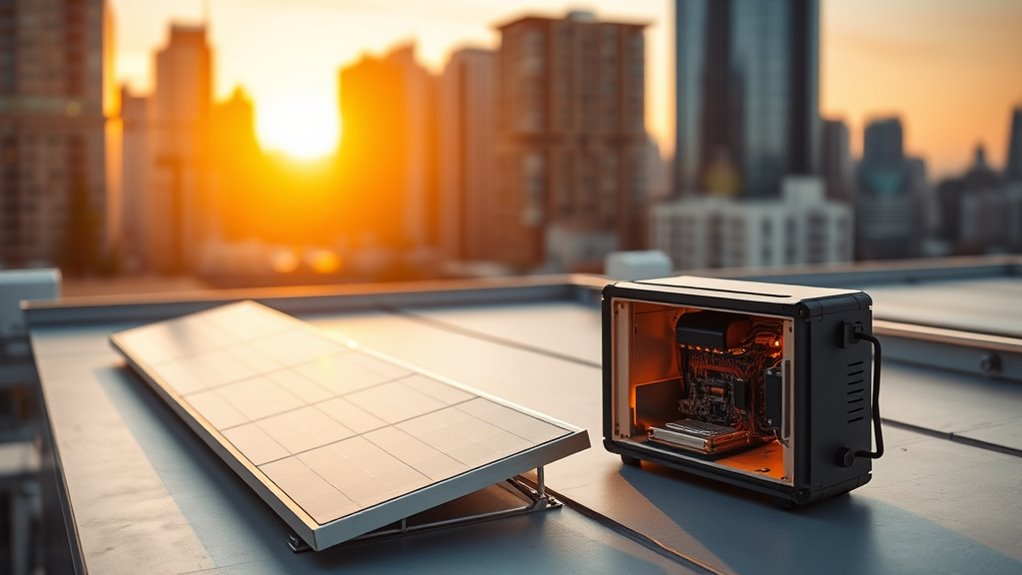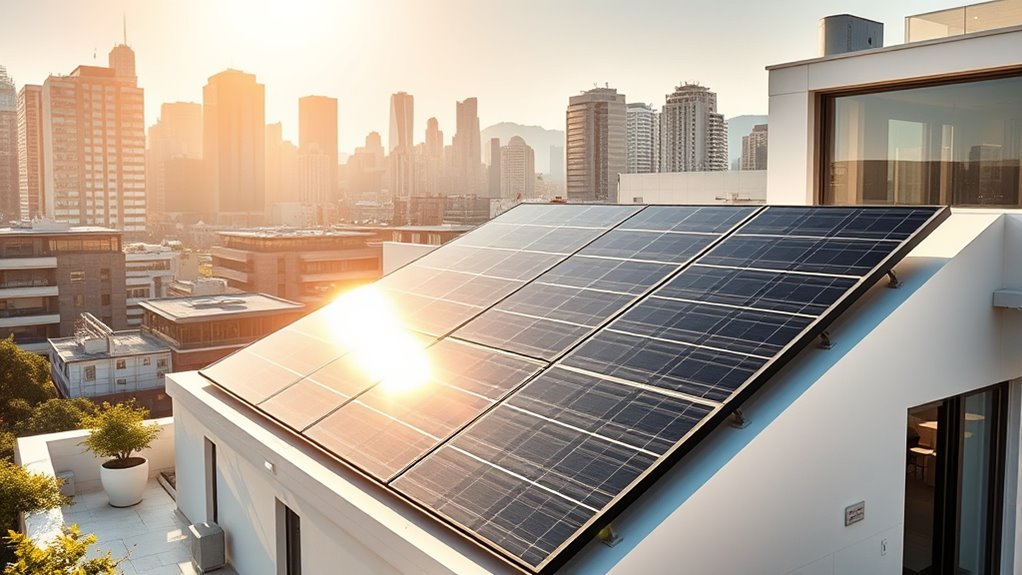Going off-grid with solar tech for urban homes lets you harness renewable energy, gain independence from traditional power grids, and cut utility costs. By installing smart meters, you can monitor and optimize your energy use in real-time, while compact storage solutions ensure reliable power when sunlight’s low. This integrated approach makes your home more sustainable and efficient. Keep exploring to discover how these technologies can transform your urban living experience.
Key Takeaways
- Off-grid solar tech offers urban homes energy independence, reducing reliance on traditional power grids and lowering utility costs.
- Smart meters enable real-time monitoring and optimization of solar energy production and consumption in city residences.
- Compact energy storage solutions ensure reliable power during low sunlight periods, supporting essential appliances in urban environments.
- Integrating solar panels, smart meters, and batteries creates an efficient, automated energy ecosystem tailored to city living needs.
- These technologies promote sustainability, lower energy bills, and enhance resilience against grid outages in urban off-grid setups.

As urban homes seek sustainable energy solutions, off-grid solar technology is becoming an increasingly viable option. You no longer need to rely solely on the traditional power grid to enjoy clean, renewable energy. With advancements in smart meters and energy storage, you can take control of your energy consumption, reduce your carbon footprint, and even lower your utility bills. Smart meters are essential tools in this *progression*, providing real-time data about your energy use. They allow you to monitor how much energy your solar system generates and how much you consume from other sources, giving you valuable insights to optimize your usage. When paired with energy storage solutions, smart meters help you manage your power more efficiently, ensuring you have energy when the sun isn’t shining or during peak demand times.
Smart meters and energy storage empower urban homes to harness renewable energy efficiently and reduce reliance on the grid.
Energy storage is the backbone of off-grid solar systems in urban environments. Instead of relying on the grid, you store excess solar energy in batteries during the day, making it available for use at night or on cloudy days. Modern batteries are compact, efficient, and affordable, enabling you to create a reliable power reserve without taking up too much space. This setup means you’re less affected by grid outages or fluctuations in utility prices. You can confidently operate essential appliances, lighting, and even small electronics, knowing your energy supply is secure.
The integration of smart meters with energy storage systems makes managing your off-grid setup seamless. You can set up automated controls, adjusting your energy consumption based on real-time data. For instance, your system can prioritize charging batteries during peak sunlight hours and reduce consumption when energy is limited. Some smart meters even allow remote monitoring through smartphone apps, giving you instant access to your system’s performance and usage patterns. This level of control helps you maximize your solar investment and minimizes waste.
Going off-grid isn’t just about installing solar panels anymore; it’s about creating a smart, integrated energy ecosystem tailored to your living needs. Using smart meters and energy storage, you can customize your energy flow, optimize efficiency, and reduce dependence on external sources. Urban homes may face limited space, but these technologies are designed to be compact and scalable, fitting into tight environments without sacrificing performance. As you embrace off-grid solar tech, you gain energy independence, lower costs, and contribute to a more sustainable future—all from the comfort of your city residence. Additionally, understanding the contrast ratio of your solar system components can help you evaluate their performance in different lighting conditions, ensuring optimal energy collection and efficiency.
Frequently Asked Questions
How Much Does Urban Solar Panel Installation Typically Cost?
When you ask about urban solar panel installation costs, you’re looking at various cost considerations and installation expenses. Typically, the cost ranges from $10,000 to $30,000 depending on your home’s size, energy needs, and local labor rates. Keep in mind, incentives and rebates can lower overall expenses. You should evaluate these factors carefully to make certain your investment is worthwhile and aligns with your energy goals.
Are There Specific Regulations for Installing Solar in City Apartments?
Oh, the joys of city living—nothing like steering through zoning restrictions and permit requirements to install solar panels in a cramped apartment. You’ll need to check local regulations, which often vary wildly, and get the necessary approvals before shining bright. Ironically, city officials love promoting clean energy but often impose strict rules, making it a challenge. So, you’ll want to research your city’s specific rules before installing your solar setup.
What Financing Options Are Available for Urban Off-Grid Solar Systems?
You can explore various financing options for urban off-grid solar systems, like community grants that support renewable energy projects and leasing options that reduce upfront costs. These alternatives make adopting solar more accessible, letting you install systems without significant initial investments. By tapping into grants or leasing agreements, you can power your city apartment sustainably while managing expenses effectively.
How Do Urban Shading Issues Affect Solar Panel Efficiency?
Shading obstacles, urban tree coverage, and tall buildings all impact your solar panel efficiency. When shade blocks sunlight, panels generate less power, reducing your system’s effectiveness. You need to take into account the placement of panels to avoid shadows cast by nearby structures or trees. By planning for these urban shading issues, you can optimize your solar setup, ensuring maximum energy production and better returns on your investment.
Can Solar Tech Power All Household Appliances in an Urban Setting?
You can power most household appliances with solar tech, but it depends on your system size and energy needs. Solar battery storage helps store excess energy for cloudy days or night use, while smart energy management optimizes your consumption. Keep in mind, urban shading may reduce efficiency, so investing in high-quality panels and efficient appliances guarantees you make the most of your solar setup.
Conclusion
By embracing solar tech, you’re not just reducing your carbon footprint—you’re challenging the idea that urban living must rely solely on the grid. While some argue off-grid systems aren’t practical in cities, recent innovations prove otherwise. You can generate your own power, save money, and promote sustainability. So, go ahead—invest in solar, prove the skeptics wrong, and show that even in the city, independence is within your reach.









